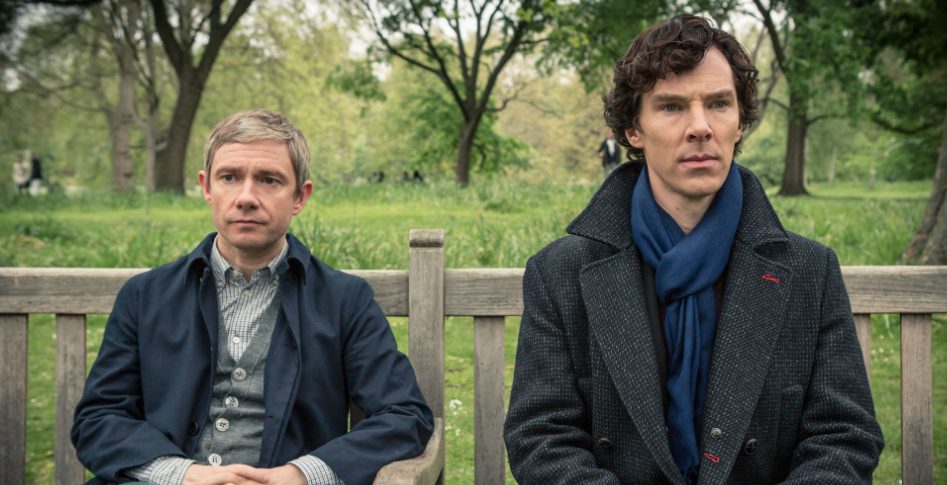Holmes is where the heart is
So, the buccaneering juggernaut that is Sherlock has been and gone, cheerily waving from its pedestal before disappearing in a characteristic trail of mystery and intrigue.
It is testament to the enduring charisma of Benedict Cumberbatch and his delightfully weary sidekick Martin Freeman that, ahead of the three-piece series, it seemed as though Britain was talking of nothing else.
Fortunately, writers Steven Moffat and Mark Gatiss successfully guided their current lovechild away from the yawning trap of anti-climax.
The first episode saw the confirmation of Sherlock’s improbable survival, a topic which has had viewers feverishly speculating since the second series ended in 2012.
To rewind, we last saw Sherlock falling from the top of a tall building, leaving Watson with the enigmatic words that it was ‘a magic trick’. Many have convincingly argued that it remains one of the most powerful television cliffhangers of all time.
Certainly, in the lead-up to the series, theories were thrown around with impunity. Was there a body double? Did Sherlock put a mask of his own face on the dead body of his nemesis, Jim Moriarty? Did the eccentric detective somehow engineer a soft landing, whilst duping Watson?
Gatiss dealt with the situation well, tantalisingly dangling solutions in front of us before snatching them away, as if to chastise our own hyperactive imagination.
Sherlock’s videotape confession still leaves a lot of unanswered questions. Thanks in part to the brimming energy of the cast, the question mark over Sherlock’s death does not linger awkwardly.
Ahead of the new series, it seemed that Britain was talking about nothing but Sherlock
Holmes and Watson’s reunion, after two years apart, is played beautifully by Cumberbatch and Freeman – the former’s jaunty buffoonery contrasts with the latter’s simmering rage.
Freeman spits like a sizzling frying pan, and his well-directed headbutts capture his eternal frustration. Sherlock himself remains as arrogant, narcissistic and obtuse as ever, but his brilliance never fails to captivate.
We feel Watson’s anguish as he originally eschews a reunion, but coaxed by his bride-to-be Mary (Amanda Abbington), he ends up returning to Sherlock’s side.
The plot centres around the deactivation of a bomb on an abandoned Tube train: a plot point dramatic at its nadir, but overall something of an afterthought to the duo’s reconciliation.
The second episode is what we contemporarily term a ‘curveball’, disconcertingly un-Sherlock-like. It places the autistic and sociopathic protagonist into the role of best man at Watson and Mary’s wedding, a role in which we expect him to flounder.
What results is some of the most moving television you are likely to see in any detective drama, as an obviously uncomfortable Sherlock delivers a heartfelt eulogy to his friend.
Cumberbatch is truly at his best here – overtly fidgety as he tries to address an assembled room of people on a personal level, yet ultimately demotic.
To see such a brilliant mind reduced to the endearingly awkward situation of trying to pay a fitting tribute at a wedding was both amusing and tear-inducing.
The necessary trip down memory lane sees Sherlock and Watson in tandem in a number of cases, ranging from The Hollow Client to The Mayfly Man and, amusingly, The Elephant In The Room – a covert way of smuggling some criminality into what was, in essence, a love-in between two of television’s hottest properties.
Nine million people gasped simultaneously at the show’s heart-stopping ending
The final episode, though, was the highlight: a truly triumphant climax.
Finally we had a villain worthy of the name – blackmailer Charles Augustus Magnussen, played by Danish actor Lars Mikkelen. His sadistic desire for humiliation was a rebuke to those who believed that Jim Moriarty was Sherlock’s only notable nemesis.
Mary Morstan’s true identity was revealed, a discovery which affirms Watson’s unconscious but undoubted desire for dangerous people.
Nine million viewers gasped simultaneously at the show’s stunning final moments.
There seems to be a nagging feeling that Sherlock has threatened to hit the high notes without consistently doing so.
Plot has often been secondary to performance: the show occasionally retreats into self-absorption, flexing its conspicuous muscles, aware of its status as top dog.
However, any weaknesses have been camouflaged by Cumberbatch and Freeman. It is impossible to see one without the other. It is also impossible to see the show without them.
This series, if nothing else, will be remembered for two of Britain’s greatest actors at their best, leaving a salivating audience in their wake.
Yes, Sherlock, like any other television series, is far from flawless. But will you be back for more in 2015? I think you just might.
Sherlock is rumoured to be returning in 2015, with sources suggesting there are plans in place for an episode on Christmas

Comments